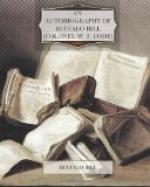The soldiers that had been sent out after us found and destroyed the village, but we did not meet them. They discovered seven or eight dead Indians, and there were a few more down in the marsh which they overlooked. The major in command sent out scouts to find our trail. Texas Jack, who was on this duty, returned and reported that he had found it, and that we were going back to the fort by another route.
The major said: “That’s another of those tricks of Cody’s. He will guide Thomas back and he will get all the glory before I can overtake him.”
We rode into Fort McPherson about six o’clock that evening. I told Thomas to make his report immediately, which he did. General Emory complimented him highly, and Thomas generously said that all he did was to obey orders and follow Cody. A report was made to General Sheridan, and the next day that officer wired Thomas his congratulations.
The next day the command that was sent out after us returned to the fort. The major was hotter than a wounded coyote. He told the general that it was all my fault, and that he did not propose to be treated in any such manner by any scout, even if it were General Sheridan’s pet, Buffalo Bill. He was told by the general that the less he said about the matter the better it would be for him. This was Lieutenant Thomas’s first raid, and he was highly elated with its success. He hoped he would be mentioned for it in Special Orders, and sure enough, when the Special Orders came along both he and myself, together with the little command, received complimentary mention. This Thomas richly deserved, for he was a brave, energetic, and dashing officer. I gave him the two war-bonnets I had taken from the Indians I shot from the back of Powder Face, asking that he present them to the daughters of General Augur, who were then visiting the Post.
Shortly after our return another expedition was organized, with the Republican River country as its destination. It was commanded by General Duncan, a blusterer, but a jolly old fellow. The officers who knew him well said we would have a fine time, as he was very fond of hunting. He was a good fighter. It was rumored that an Indian’s bullet could never hurt him. A cannon-ball, according to report, had hit him in the head without injuring him at all, while another cannon-ball, glancing off his skull, had instantly killed one of the toughest mules in the army!
The Pawnee scouts, who had been mustered out of service during the winter of 1869 and ’70, were reorganized to accompany this expedition. I was glad of this. I had become very much attached to Major North, one of the officers, and to many of the Indians. Beside myself the only white scout we had in the Post at this time was John Y. Nelson, whose Indian name was Cha-Sha-Cha-Opeyse, or Red-Willow-Fill-the-Pipe. The man was a character. He had a squaw wife and a half-breed family. He was a good fellow, but had few equals and no superiors as a liar.




